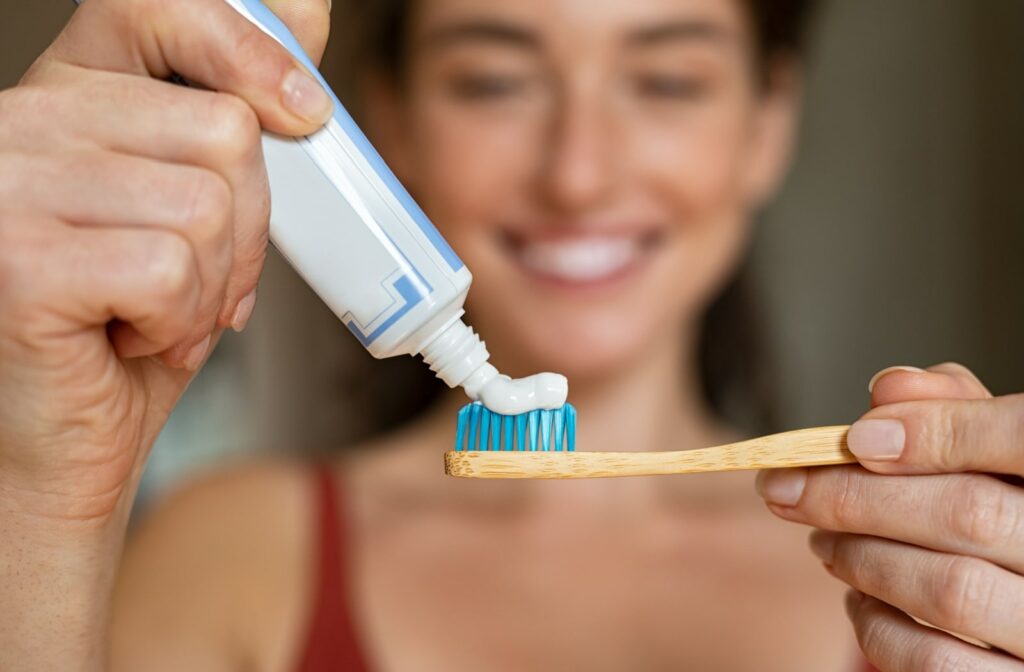We’d all like to make the best choices to help preserve and maintain beautiful, healthy smiles. There’s more to oral care than just brushing twice a day and flossing. Some of us are interested in taking our oral care further to have white, bright, and shiny smiles.
Fluoride has many dental benefits, but teeth whitening isn’t one of them. However, incorporating fluoride into your oral care routine helps to preserve and maintain healthy teeth. Fluoride helps to strengthen tooth enamel and helps prevent tooth discolouration and cavity formation.
While fluoride does not contain an active agent that helps to whiten teeth and remove stains, it can be used after teeth whitening treatments to help strengthen enamel and decrease tooth sensitivity.
What Is Flouride?
Fluoride is a natural mineral found in our bones and teeth. It strengthens tooth enamel and prevents cavities. Enamel is the white, hard, and outermost layer of our teeth. Strengthening the enamel can give your teeth a whiter appearance. If your enamel becomes thin, the dentin layer of your tooth is exposed, which has a slight yellow tint.
Although water contains some natural fluoride, these levels are not strong enough to prevent tooth decay. Adding small amounts of fluoride to community drinking water is a cost-effective way to help prevent tooth decay in a large population. This process is called water fluoridation. The City of Hamilton has been fluoridating drinking water since 1966.
Fluoride doesn’t have the active properties to break down pigment molecules and lift deep stains like the agents in traditional whitening products do. However, it can help prevent tooth discolouration by strengthening enamel.
What Causes Tooth Discolouration?
Our enamel is white, but our teeth naturally have a light grey-yellow shade because of our dentin.
Teeth can stain over time due to food, drink, and lifestyle choices. Teeth whitening treatments can help remove staining and give teeth a bright white appearance.
There are 2 types of tooth stains: intrinsic and extrinsic. Extrinsic stains are caused by foods and drinks that stain teeth, like coffee, tea, and red wines. Extrinsic stains also include lifestyle habits like smoking and vaping that can lead to tooth discolouration.
Most at-home teeth whitening treatments work on surface-level stains, so they can only tackle extrinsic stains.
Sources of Fluoride
These sources of fluoride and treatment options include different concentrations of fluoride depending on the severity of tooth decay and enamel thinning, so it is best to always consult your dentist to determine which source of fluoride will best suit your oral health needs.
- Toothpaste
- Mouth rinses
- Supplements
- Gels and foams
- Varnishes
Most Canadian cities fluoridate their drinking water to help prevent tooth decay in their local population. Brushing twice daily with fluoridated toothpaste and drinking fluoridated water can help strengthen most people’s enamel and prevent cavities.
Be moderate with your fluoride intake, as there can be risks associated with high fluoride intake.
Risks of Fluoride
Small quantities of fluoride can be beneficial for dental health, helping strengthen enamel to prevent cavities and tooth decay. However, too much fluoride can lead to side effects such as dental fluorosis and skeletal fluorosis.
Dental fluorosis changes the appearance of your enamel. Small white spots or streaks will appear on the enamel of adult teeth. Dental fluorosis is caused by too much fluoride intake over a period of time when adult teeth are still forming under the gums.
Children 8 and under are at risk for dental fluorosis because their permanent teeth are still developing, so they should avoid excessive fluoride. However, individuals over 8 are not at risk.
The severity of dental fluorosis depends on how much fluoride was taken over a period of time. Its mild form presents in the appearance of white spots on adult tooth enamel and is considered to be a cosmetic concern. The spotting doesn’t affect an individual’s dental or overall health.
Treatments for Teeth Whitening
Flouride can strengthen the enamel and reduce tooth discolouration, but it cannot act as a teeth-whitening agent. It doesn’t contain the active properties needed to break down pigment molecules and lift extrinsic tooth stains like traditional teeth-whitening treatments.
Teeth whitening treatments can be done at home using over-the-counter products or professionally by your dental team. Because they are done by professionals, teeth whitening treatments conducted by your dental team can be more effective in removing stains, brightening smiles, and whitening teeth than at-home kits.
After a teeth whitening treatment, your dentist may perform a fluoride treatment to help strengthen enamel that may have been weakened during the whitening treatment and counteract any tooth sensitivity.
Consult Your Dental Team in Hamilton
While fluoride isn’t the best agent for teeth whitening treatments, fluoride can help strengthen enamel, lessen dentin exposure, and prevent tooth discolouration. If you’re interested in fluoride treatment, consult your dentist! Visiting your dentist for regular exams and cleanings is important to help maintain healthy, clean, and beautiful smiles. Contact our Upper Gage Dental Centre team to learn more about teeth cleanings and teeth whitening treatments!



